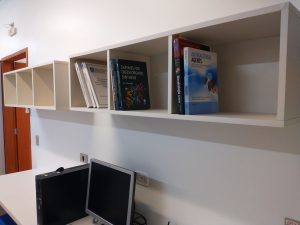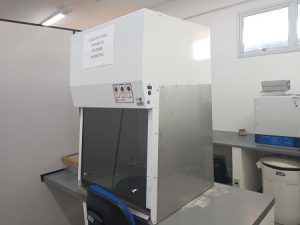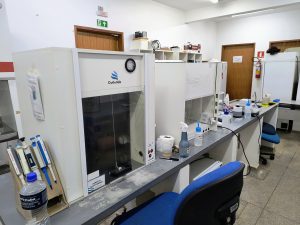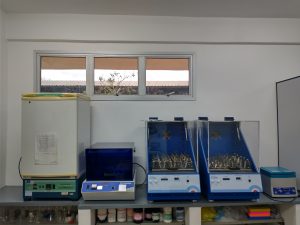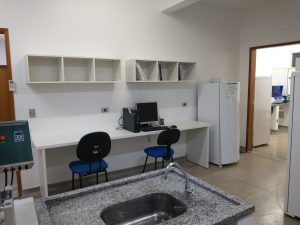Bioassays
 This laboratory is equipped to bioassay natural and synthetic organic compounds, particularly to explore features related to: This laboratory is equipped to bioassay natural and synthetic organic compounds, particularly to explore features related to:
-
-
- antibacterial activity
- larvicidal properties
- antioxidant ability
- tyrosinase inhibition
- acetylcholinesterase (AChE) inhibition
Biotransformation/biocatalysis
 We use enzymes and microorganisms to biotransform and biocatalyze organic substrates, whether bioactive or not, to initiate or enhance biological activity. We use enzymes and microorganisms to biotransform and biocatalyze organic substrates, whether bioactive or not, to initiate or enhance biological activity.
Molecular bioprospection
 The research activities are aimed at the bioprospecting of novel bioactive molecules (peptides and small molecules) from fungi and value-added products for providing better human and animal health. The focus is mainly on finding the solutions for drug-resistant infections (bacterial and fungal). The research activities are aimed at the bioprospecting of novel bioactive molecules (peptides and small molecules) from fungi and value-added products for providing better human and animal health. The focus is mainly on finding the solutions for drug-resistant infections (bacterial and fungal).
Production of antibiotics
 Antibiotic production by microorganisms is one of their more interesting features, particularly from a medical and commercial perspective. Penicillins and cephalosporins belong to the class of drugs known as β-lactams. Penicillium chrysogenum naturally produces penicillins, which we classify as 1st generation. The 2nd, 3rd, and 4th generations are all semi-synthetic, obtained from chemical synthesis starting from 6-APA. The cephalosporins used in medicine are modified versions of 7-ACA, which come from cephalosporin C made by the fungus Acremonium chrysogenum. Semi-synthetic penicillins and cephalosporins continue to interest many research groups to discover new antibiotics that may tackle super bacteria. 6-APA and 7-ACA are essential starting materials used in studies on the synthesis of the β-lactam drugs. We are interested in producing 6-APA and 7-ACA using biotechnological processes. Antibiotic production by microorganisms is one of their more interesting features, particularly from a medical and commercial perspective. Penicillins and cephalosporins belong to the class of drugs known as β-lactams. Penicillium chrysogenum naturally produces penicillins, which we classify as 1st generation. The 2nd, 3rd, and 4th generations are all semi-synthetic, obtained from chemical synthesis starting from 6-APA. The cephalosporins used in medicine are modified versions of 7-ACA, which come from cephalosporin C made by the fungus Acremonium chrysogenum. Semi-synthetic penicillins and cephalosporins continue to interest many research groups to discover new antibiotics that may tackle super bacteria. 6-APA and 7-ACA are essential starting materials used in studies on the synthesis of the β-lactam drugs. We are interested in producing 6-APA and 7-ACA using biotechnological processes.
Support
Synthetic Biology
 Synthetic biology (SynBio) is a multidisciplinary science that combines engineering principles with biology to create new biological parts, devices, and systems, or to redesign existing systems from nature. Two main areas divide the expanding field of synthetic biology. The first area focuses on using artificial molecules to mimic emergent behaviors seen in natural biology, with the aim of creating artificial life. The second area involves isolating interchangeable components from natural systems to build new systems that exhibit non-natural behaviors. Both areas strive to develop innovative systems with modular components that can function autonomously at the molecular level, a challenge that is more complex than in the macroscopic world. This field advances our understanding of how chemical and genetic interactions lead to emergent properties by creating living chemical systems and new organisms. Scientists have engineered synthetic genetic systems capable of Darwinian evolution, offering insights into the chemical limits of genetic frameworks. Additionally, synthetic biologists have designed “toy” organisms and systems, such as an oscillation system and a molecular automaton that can play tic-tac-toe. The field also explores advanced strategies for designing metabolic pathways and manipulating genetic elements to produce essential compounds, like antibiotic precursors and polymers. While nucleic acids have achieved success in creating interchangeable parts, amino acids and protein structures have not yet reached the same level of success. Although using interchangeable genetic elements is possible, it comes with its set of challenges. The development of synthetic chemical systems capable of Darwinian evolution links inanimate matter with living organisms but also raises concerns about potential malicious uses of this technology. Synthetic biology (SynBio) is a multidisciplinary science that combines engineering principles with biology to create new biological parts, devices, and systems, or to redesign existing systems from nature. Two main areas divide the expanding field of synthetic biology. The first area focuses on using artificial molecules to mimic emergent behaviors seen in natural biology, with the aim of creating artificial life. The second area involves isolating interchangeable components from natural systems to build new systems that exhibit non-natural behaviors. Both areas strive to develop innovative systems with modular components that can function autonomously at the molecular level, a challenge that is more complex than in the macroscopic world. This field advances our understanding of how chemical and genetic interactions lead to emergent properties by creating living chemical systems and new organisms. Scientists have engineered synthetic genetic systems capable of Darwinian evolution, offering insights into the chemical limits of genetic frameworks. Additionally, synthetic biologists have designed “toy” organisms and systems, such as an oscillation system and a molecular automaton that can play tic-tac-toe. The field also explores advanced strategies for designing metabolic pathways and manipulating genetic elements to produce essential compounds, like antibiotic precursors and polymers. While nucleic acids have achieved success in creating interchangeable parts, amino acids and protein structures have not yet reached the same level of success. Although using interchangeable genetic elements is possible, it comes with its set of challenges. The development of synthetic chemical systems capable of Darwinian evolution links inanimate matter with living organisms but also raises concerns about potential malicious uses of this technology.
Click here and learn more about synthetic biology
Contact us by email: sintmol.lab@gmail.com
|











